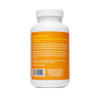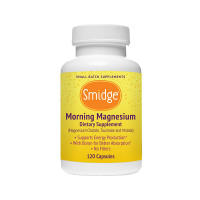Get the benefits of raw grass-fed beef liver without having to taste it!
120 Capsules ~ Serving Size: 4 capsules ~ Servings per Bottle: 30
Are you eating enough nutrient dense grass-fed beef liver?
All organ meat is extremely nutrient dense and great for our bodies. The Westin A Price Foundation recommends people eat at least 7 oz of good organ meat every week. If you are getting this in a powdered form, 3000mg is equal to 1 oz of raw beef liver and 1 oz daily will get you to the 7 oz weekly goal set by the Westin A Price Foundation. See dosage information below for more on this.
While organ meat was prized by our ancestors back to the very beginning of our species, modern people rarely eat it. Thankfully, companies like Smidge have brought us high quality, raw powdered beef liver so we don't have to. Smidge Beef Liver is a freeze dried beef liver sourced from 100% grass-fed New Zealand cattle. Only the best ingredients go in, and nothing extra. No preservatives, fillers or flow agents.
Why is eating organ meat so important?
As stated above, way back in the beginning and for eons, people cherished organ meat and made it a fundamental part of their diets. Some would say it was the very first superfood!
Nowadays, very few people make it a staple in their diets and most will look at you funny if you ask them about eating organ meat. Let's find out what our ancestors knew – what makes organ meat so special?
Organ meat is full of enzymes, protein, amino acids, and other various cell tissue specific to that organ in us, too. We get what is called "like for like" benefits when we eat nutrient dense organ meat. This means that eating beef liver is good for our liver, and eating beef heart is good for our heart and so on.
And, this theory has been confirmed by modern science:
The University of Scotland in Edinburgh did research that supports the theory that eating animal organs potentially improves the health in our corresponding organs. Dr. Ron Schmid, ND, who conducted this experiment explains:
“Radioisotope labelling studies in animals have shown conclusively that, when eaten, organs and glands selectively travel to the corresponding organs and glands in high concentrations. This research, done at the University of Scotland in Edinburgh, lends credence to the ancient practice of eating animal organs to help ensure health in one’s corresponding organs…”
As you can see, this is compelling evidence to start practicing what our ancient ancestors knew instinctively to do – eat organ meat.
Why do we think Smidge Beef Liver is a great grass-fed supplement?
Smidge takes pride in offering superior small batch supplements crafted with care. They care about what goes into their products, only clean carefully sourced ingredients. Also of note is what never goes in – additives, fillers or flow agents of any kind.
We love Smidge Beef Liver because it is:
- Sourced 100% from clean grass-fed New Zealand cows
- It's non-defatted for a more complete range of fat soluble vitamins
- Last measured at 2.9 mg of highly bioavailable iron per serving*
- No excipient ingredients – additives, fillers or flow agents
- No dairy products, milk or casein
- No eggs, yolk or whites
- No fish or shellfish
- No peanuts or tree nuts
- No wheat or gluten
- No yeast
- No soy of any kind
Suggested Dosage & Usage for Smidge Beef Liver.
Smidge recommends taking 4 capsules daily with or without food.
As stated above, the Westin A Price Foundation recommends getting 3000mg of organ meat daily and the Smidge 4 capsule serving is only a 2000mg serving. We recommend taking 6 capsules daily or, better yet, mixing it up with a different grass-fed organ supplement from our NXGEN line of Beef organs. Personally, I take 4 of the Female Optimise daily and 2 of the Beef Liver. I often switch it up an just make sure I'm getting at least 3000mg or 1 oz daily.
* These statements have not been verified by the FDA or any government agency here or in New Zealand. This is not meant to treat diagnose or prevent any diseases.









